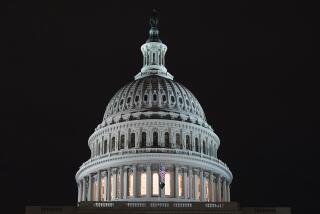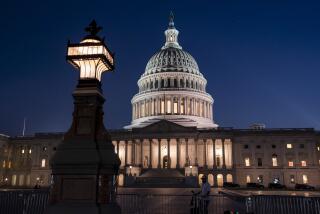Tax relief, yes; deficit relief, no
WASHINGTON — Congress agreed Wednesday to spare more than 20 million taxpayers from the alternative minimum tax this year, bowing to Republican demands that the $50 billion in tax relief not be offset with any tax increases elsewhere.
On the last day of legislative business this year, the House voted 352-64 to “patch” the so-called AMT, ensuring that millions of middle-class households -- some with incomes as low as $75,000 -- will be sheltered from the tax’s bite.
President Bush is expected to sign the bill, which the Senate has already approved.
Congress passed the AMT in 1969 to prevent the nation’s richest households from avoiding paying income taxes by claiming extensive deductions. But the measure was never adjusted for inflation.
As a result, its formula has forced up tax payments for a growing number of Americans, compelling Congress to step in repeatedly with short-term fixes.
In June, the Joint Committee on Taxation estimated that this year 81% of taxpayers with annual incomes between $100,000 and $200,000 and 49% of taxpayers with incomes between $75,000 and $100,000 would have been subject to higher taxes under the AMT.
Both parties agreed that middle-income taxpayers should be protected. The issue was always the cost.
Wednesday’s vote marked a significant defeat for congressional Democrats, who had fought to offset the lost revenue with taxes on a small group of very wealthy Americans.
Democrats also did not succeed in extending a series of popular tax breaks sought by businesses, including a research-and-development tax credit. In addition, they could not muster support to expand the child tax credit to help the parents of millions of low-income children.
But the vote ended a high-stakes game of chicken between the two parties over a tax that threatened to hit eligible Americans with an average $2,000 tax increase his year.
“What are our options?” asked House Ways and Means Committee Chairman Charles B. Rangel (D-N.Y.), who had pushed for legislation that did not add to the federal deficit.
“We could stick to our fiscal guns. We could say the right thing to do is not to pass a bill that’s not paid for,” Rangel said. “Or we could say, why hold 23 million taxpayers hostage because of the irresponsibility of the minority in not being willing to pay for this?”
Rep. Jim McCrery of Louisiana, the ranking Republican on the committee and a staunch opponent of the Democratic tax plan, hailed the settlement.
“This is good news for those taxpayers,” he said. “It’s good news for the economy at a time when many economists are worried about our economy going into recession.”
Unlike the standard income-tax calculation, which allows multiple deductions, the AMT calculation is designed to limit deductions. There are no deductions for children, for example, so families with many offspring lose a substantial tax break. The AMT also disallows deductions for state and local taxes, which play an important role in reducing taxes for residents in states, such as California, that have income taxes.
Taxpayers who meet certain income or deduction criteria must calculate how much income tax they owe under the standard method and also how much they would owe under the AMT method. Then they compare the two results and must pay whichever is greater.
Estimates of the number of taxpayers who will be spared the tax under the plan approved Wednesday vary considerably.
Under the legislation, most of the roughly 4 million taxpayers who paid the tax last year will pay it again. But without the patch, some estimates conclude that as many as five times that number of taxpayers could have been subject to the alternative minimum tax.
This year Democrats, who sought to bring more fiscal responsibility to Capitol Hill after years in which Republicans ran up the national debt to more than $9 trillion, contended that paying for a fix was the only fiscally responsible approach.
Republican lawmakers fiercely resisted, arguing that tax hikes hurt the economy.
House Democrats -- sticking to the pay-as-you-go budgeting rules they reinstated in January -- twice this fall passed measures meant to offset the cost of the AMT fix by targeting some of the country’s wealthiest taxpayers.
The Democratic tax increases would have affected the managers of investment partnerships and wealthy individuals who benefit from offshore tax havens.
Each time, however, the measures died in the closely divided Senate, where the 49-strong Republican caucus was able to block the proposals, most recently on Tuesday night.
With the impasse threatening to slow the Internal Revenue Service’s processing of refunds next year, Democratic leaders finally agreed to stop insisting on an offset.
In the end, 64 House Democrats, many of them members of the fiscally hawkish Blue Dog Coalition, voted against the compromise.
--
jonathan.peterson@ latimes.com
More to Read
Get the L.A. Times Politics newsletter
Deeply reported insights into legislation, politics and policy from Sacramento, Washington and beyond. In your inbox three times per week.
You may occasionally receive promotional content from the Los Angeles Times.











